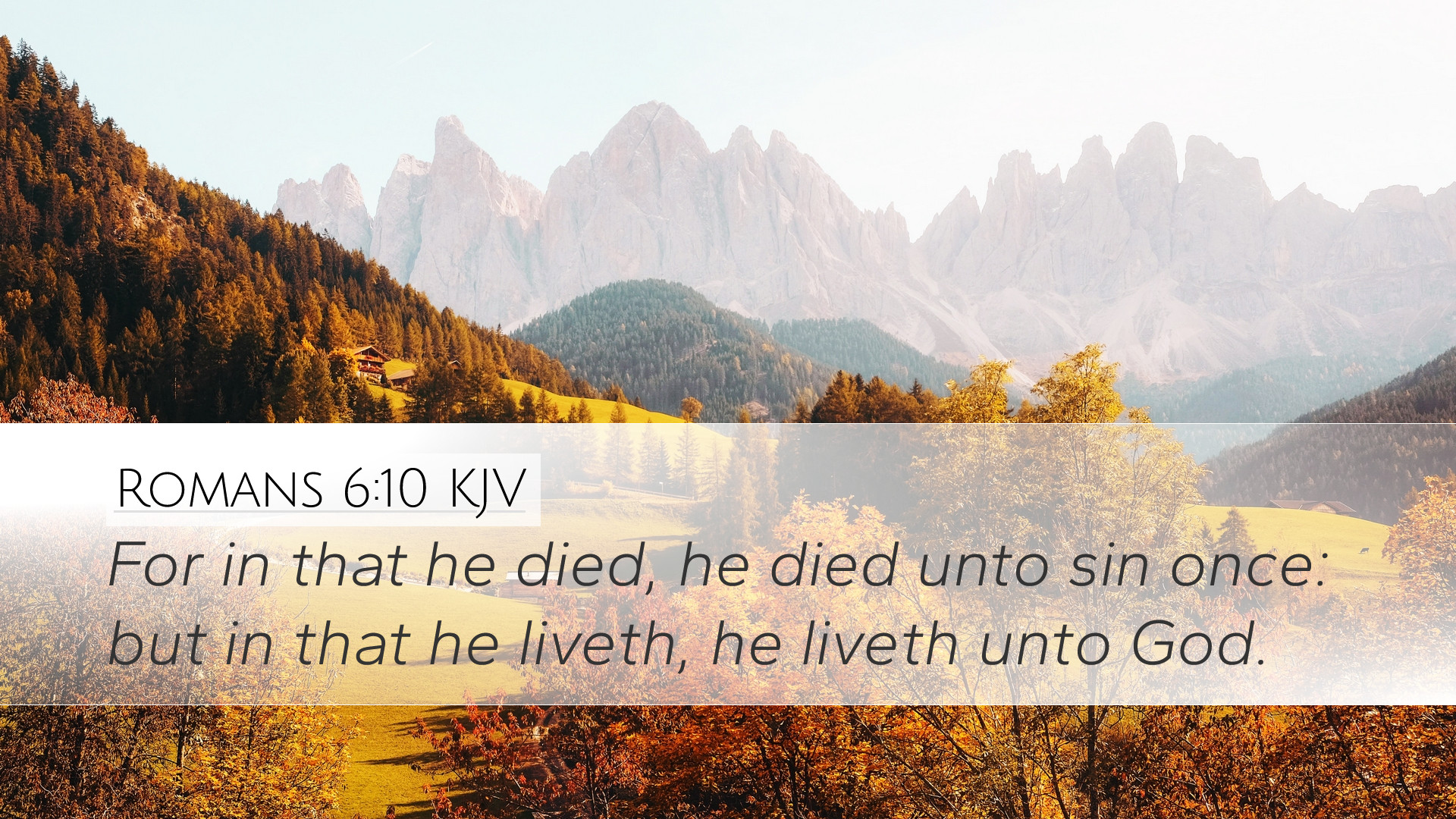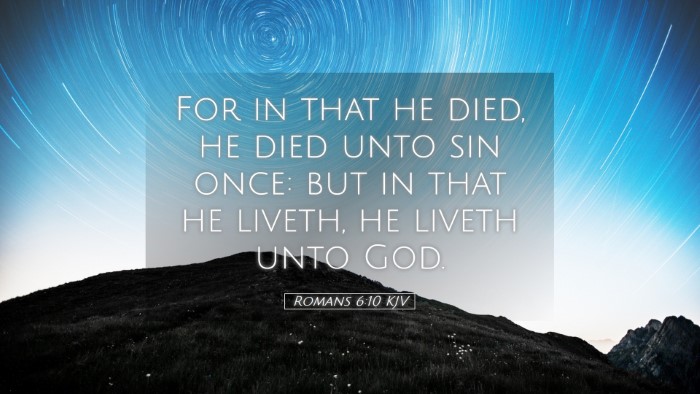Old Testament
Genesis Exodus Leviticus Numbers Deuteronomy Joshua Judges Ruth 1 Samuel 2 Samuel 1 Kings 2 Kings 1 Chronicles 2 Chronicles Ezra Nehemiah Esther Job Psalms Proverbs Ecclesiastes Song of Solomon Isaiah Jeremiah Lamentations Ezekiel Daniel Hosea Joel Amos Obadiah Jonah Micah Nahum Habakkuk Zephaniah Haggai Zechariah MalachiRomans 6:10
Romans 6:10 KJV
For in that he died, he died unto sin once: but in that he liveth, he liveth unto God.
Romans 6:10 Bible Commentary
Commentary on Romans 6:10
Romans 6:10 states: "For in that He died, He died to sin once for all; but in that He lives, He lives to God." This verse encapsulates profound theological truths about the nature of Christ’s sacrifice and the implications for believers. Below, we explore insights from esteemed public domain commentators such as Matthew Henry, Albert Barnes, and Adam Clarke.
Understanding Christ's Death and Resurrection
According to Matthew Henry, this verse emphasizes the finality of Christ’s death regarding sin. Henry asserts that Christ's death was not an ongoing sacrifice but rather a once-for-all event that was fully sufficient for the atonement of humanity's sins. His resurrection serves as a confirmation of this victory over sin and death.
Albert Barnes echoes this sentiment, stressing that Christ’s death had the definitive purpose of dealing with sin. He notes that by dying “once for all”, Jesus removed the burden of sin that previously dominated human existence. Christians are thus called to recognize that through Christ’s death, sin no longer holds authority over them.
Adam Clarke expands on this by highlighting the implications of Christ's resurrection. He suggests that just as Christ, having been raised from the dead, now lives to the glory of God, believers are similarly called to live out their faith dynamically, reflecting the new life bestowed upon them.
Theological Implications of Sin and Death
This verse invites an exploration of the theological ramifications of sin and death. Henry remarks on the dual nature of life and death as it pertains to Christ: there is a decisive break from the power of sin through His sacrificial death!
Barnes emphasizes the idea of sin's dominion, pointing out that through Christ, believers are liberated from the chains of sin. By rising again to life, Jesus did not merely conquer physical death but also defeated spiritual death, which represents eternal separation from God.
Clarke delves into the notion of living “to God” post-resurrection. Such living is not passive; instead, believers are called to engage actively in service and worship, reflecting the transformative power of Christ’s resurrection in their deeds and thoughts.
Exhortation to Believers
This passage serves as a profound exhortation for Christians to understand their identity in Christ. Matthew Henry encourages believers to live in the light of Christ’s victory, asserting that since He has died to sin, they, too, must reckon themselves dead to sin and alive to God.
From Barnes' perspective, this reckoning is transformational. He urges that recognition of one’s new identity in Christ leads to a life characterized by righteousness, not sinfulness. This active response to the gospel marks the believer’s journey of sanctification.
Clarke connects this call to discipleship, teaching that believers should joyfully embrace their new lives in Christ. The resurrection signifies a new beginning and a fresh empowerment for living a life that brings honor to God.
Living to God
The phrase "lives to God" carries significant weight in this verse. Henry elucidates that living to God involves obedience and service. Believers, having been raised with Christ, are now enabled to walk in newness of life.
Barnes provides clarity on what it means to live to God, suggesting that it encompasses glorifying God in every action and thought. He articulates the necessity of dedicating one’s life to fulfill God’s will and purposes.
Furthermore, Clarke points out that living to God extends beyond mere moral actions; it represents a deep relational aspect of faith where believers continually seek to nurture their relationship with God. Clarke insists that this living is both a privilege and an obligation, demonstrating faith through love and good works.
Conclusion
In summary, Romans 6:10 encapsulates key aspects of the Christian faith: the finality of Christ’s sacrificial death, the ongoing victory over sin, and the imperative for believers to live lives fully devoted to God. The insights provided by Matthew Henry, Albert Barnes, and Adam Clarke amplify our understanding of this profound truth.
As pastors, students, theologians, and scholars meditate on this passage, let it be a reminder of the transformative power of Christ’s work and an encouragement to embrace a life that reflects His glory.


